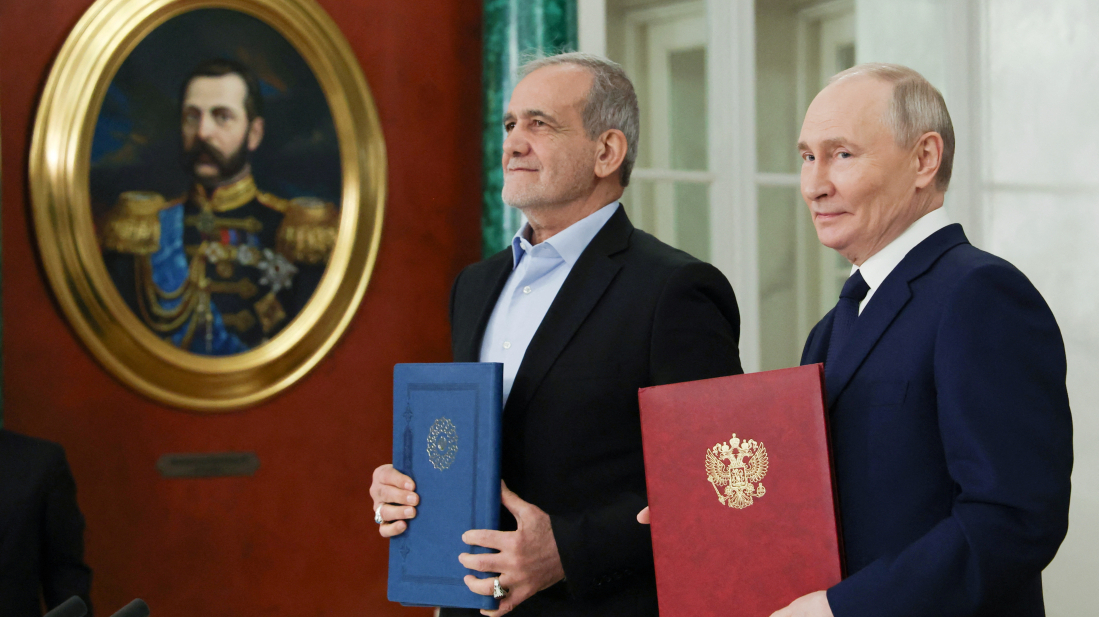live Israeli military says it has launched fresh strikes on Tehran: All the latest news on the Iran strikes
The Israeli military has begun a new wave of strikes on Tehran, it said late on Monday. The strikes came after it issued...

The Comprehensive Strategic Partnership Treaty between Iran and Russia came into effect on Thursday and will remain valid for 20 years, marking a success for Tehran just days after the return of pre-2015 UN nuclear sanctions.
Iran’s Foreign Ministry said the two countries will spare no effort to safeguard multilateralism and respect for international law, “by strengthening cooperation within the framework of multilateral organisations and arrangements such as BRICS and the Shanghai Cooperation Organisation.”
The Strategic Partnership Pact, concluded on 17 January 2025 in Moscow by President Masoud Pezeshkian and President Vladimir Putin, outlines enhanced cooperation between Tehran and Moscow across bilateral, regional, and international fields.
The treaty comprises 47 articles covering collaboration in technology, information and cybersecurity, peaceful nuclear energy, counterterrorism, regional cooperation, environmental protection, and combating money laundering and organised crime.
The announcement follows the reinstatement of UN nuclear sanctions on Iran last week, despite a joint Russia-China draft resolution at the Security Council proposing a six-month delay in their return.
Tehran has also signed a comprehensive 25-year cooperation agreement with Beijing. Foreign Minister Abbas Araghchi, in a message marking China’s National Day, described China as Iran’s “comprehensive strategic partner.” He added: “Regardless of any possible changes in the international situation, Iran will continue to deepen its relations with China.”
In response to the sanctions, Iran strongly condemned the Group of Seven (G7) for supporting the reinstatement. Foreign Ministry Spokesman Esmaeil Baghaei described the G7’s backing of the EU/US action as “hypocritical and a distortion of reality,” favouring a measure that “violated international law.”
G7 foreign ministers, meanwhile, welcomed the snapback mechanism invoked by France, Germany, and the UK (E3) to restore UN nuclear sanctions.
Follow the latest developments and global reaction after the U.S. and Israel launched “major combat operations” in Iran, prompting retaliation from Tehran.
Saudi Arabia’s state oil giant Saudi Aramco closed its Ras Tanura refinery on Monday following an Iranian drone strike, an industry source told Reuters as Tehran retaliated across the Gulf after a U.S.-Israeli attack on Iranian targets over the weekend.
The Kremlin is utilising the recent United States and Israeli military strikes on Iran to validate its ongoing war in Ukraine. Russian officials are pointing to the escalation in the Middle East as evidence that Western nations do not adhere to international rules.
The Middle East crisis intensifies after the deadly attack on the compound of the Supreme Leader of Iran Ali Khamenei on Saturday that killed him, other family members and senior figures. Iran has launched retaliatory strikes on U.S. targets in the region.
Ayatollah Alireza Arafi has moved into a pivotal constitutional role following the death of Supreme Leader Ayatollah Ali Khamenei, becoming the clerical member of Iran’s temporary leadership council under Article 111 of the Constitution of the Islamic Republic of Iran.
Start your day informed with AnewZ Morning Brief. Here are the top news stories for the 3rd of February, covering the latest developments you need to know.
Canadian Prime Minister Mark Carney arrived in Australia on Tuesday (3 March), aiming to bolster relations between the two so-called "middle powers" amid what he has called a "rupture" in world order.
Former U.S. President Bill Clinton told lawmakers that President Donald Trump told him he had "some great times" with convicted sex offender Jeffrey Epstein before their relationship soured, according to a video released on Monday (2 March).
The U.S.-Iran crisis has entered its third day, with further strikes reported across the Middle East and the death toll rising. Oil prices have surged to levels last seen during the Covid-19 pandemic, raising fears of economic disruption and higher prices worldwide.
The UK said it's allowing the U.S. to use its bases for defensive strikes against Iran amid escalating missile attacks, after a suspected drone strike hit a British airbase in southern Cyprus, causing limited damage.
You can download the AnewZ application from Play Store and the App Store.

What is your opinion on this topic?
Leave the first comment